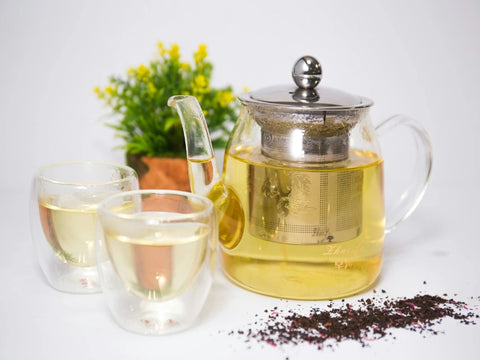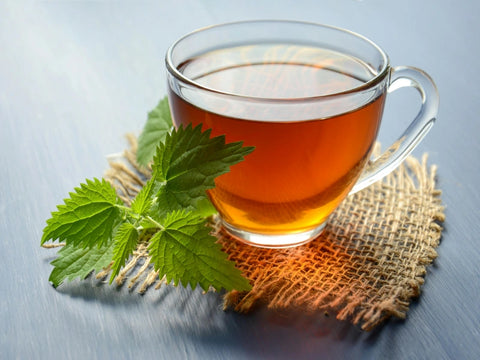Coffee has long been a popular beverage for its caffeine kick and rich flavor and aroma. However, for those looking to reduce their caffeine intake or explore healthier options, there are plenty of delicious alternatives to coffee. With the growing trend of wellness lifestyles, it's important to consider what we consume and how it affects our bodies. In this article, we will explore the reasons for seeking coffee alternatives and what makes a good alternative. Let's dive in!
Why Look for Coffee Alternatives?While coffee provides energy and a sense of alertness, it also comes with some downsides. Excessive caffeine intake can lead to restlessness, anxiety, and even sleep disturbances. Moreover, coffee can also cause digestive issues for some individuals. By choosing a healthier alternative, you can avoid these potential side effects and still enjoy a delicious beverage.
Read: The Truth About Vegan Coffee
When searching for a coffee alternative, it's important to consider a few factors:
1. Similar Taste and AromaA good alternative should provide a similar flavor and aroma as coffee, which is why many people struggle with giving up coffee. Look for options that closely resemble the taste and aroma of coffee to make the transition easier.
2. Caffeine-Free or Lower Caffeine ContentFor those looking to decrease their caffeine intake, it's important to choose an alternative that is either caffeine-free or has a lower caffeine content. This will help avoid the potential side effects of excessive caffeine consumption.
3. Health BenefitsMany coffee alternatives offer health benefits such as antioxidants, anti-inflammatory properties, and improved digestion. Consider which benefits are most important to you when choosing an alternative.
What Are the Best Coffee Alternatives?
There are several delicious options for coffee alternatives, including:
1. Herbal TeasHerbal teas like chamomile, peppermint, and ginger can provide a similar taste and aroma to coffee while also offering various health benefits.
2. MatchaMatcha is a type of green tea that is ground into a fine powder and provides a boost of energy without the crash often associated with coffee.
3. Yerba MateYerba mate is a type of herbal tea that is popular in South America and provides a similar caffeine kick as coffee without the jitters.
4. Chicory Root CoffeeChicory root is often used as a coffee substitute and has a similar flavor and aroma. It also offers health benefits such as improved digestion.
5. Dandelion Root CoffeeDandelion root can be roasted and ground to create a coffee-like drink that is caffeine-free and rich in antioxidants.
6. Mushroom CoffeeMushroom coffee is made from medicinal mushrooms like reishi or chaga, which offer various health benefits and a similar taste to coffee.
7. Grain-Based Coffee SubstitutesGrain-based coffee substitutes, such as roasted barley, offer a similar taste and aroma to coffee without the caffeine.
How to Make the Perfect Cup of Coffee Alternative?Making the perfect cup of coffee alternative involves a few key elements:
1. Choosing the Right IngredientsChoose high-quality, organic ingredients to ensure the best taste and health benefits.
2. Brewing MethodsDifferent alternatives may require different brewing methods, so be sure to follow the instructions for each specific option.
3. Adding Flavor EnhancersEnhance the flavor of your alternative by adding natural sweeteners or spices like cinnamon or nutmeg.
ConclusionWhile coffee can be a delicious and energizing beverage, there are many reasons to explore alternatives. By considering taste, caffeine content, and health benefits, you can find the perfect coffee alternative for your lifestyle. So, go ahead and try out some of these delicious options for a healthier and more enjoyable caffeine fix!
Key Takeaways:
Why Look for Coffee Alternatives?
Why seek coffee alternatives? It's important to diversify your beverage options, reduce caffeine intake, and explore new flavors and potential health benefits. Consuming too much coffee can lead to increased anxiety, disrupted sleep, and dependency. By trying alternatives like matcha, yerba mate, or golden milk, you can enjoy a variety of flavors and potentially lower caffeine levels. Additionally, herbal teas such as chamomile, peppermint, or rooibos offer relaxation and hydration without the stimulating effects of coffee. Moreover, exploring alternative beverages allows you to discover new ingredients, broaden your palate, and support a wellness-focused lifestyle. Healthy Coffee Alternatives: Delicious Options for a Wellness Lifestyle
What Makes a Good Coffee Alternative?

1. Similar Taste and Aroma
- Start with the right base: Look for coffee alternatives that offer a similar taste and aroma to your preferred coffee blend. Options like chicory root coffee, dandelion root coffee, and mushroom coffee are known for their rich and robust flavors, closely resembling traditional coffee.
- Experiment with flavor profiles: Adjust the ingredients and brewing methods to achieve a taste and aroma reminiscent of coffee. For instance, incorporating roasted chicory root into your brew can impart a deep, earthy flavor, while adding roasted dandelion root can contribute to a slightly nutty and bitter undertone.
- Consider brewing techniques: Utilize methods like French press or pour-over to extract maximum flavor and aroma from your chosen coffee alternative. Be sure to pay attention to water temperature and steeping time for optimal results.
2. Caffeine-Free or Lower Caffeine Content
- Opt for caffeine-free alternatives like herbal teas, chicory root coffee, and dandelion root coffee.
- Choose options with lower caffeine content such as matcha, yerba mate, and mushroom coffee.
3. Health Benefits
- Antioxidants: Many coffee alternatives, like herbal teas, matcha, and mushroom coffee, contain high levels of antioxidants that can provide numerous health benefits, including combating inflammation and reducing the risk of chronic diseases.
- Stomach-friendly: Some coffee substitutes, such as chicory root coffee and dandelion root coffee, are known for being gentler on the stomach and can alleviate digestive discomfort for individuals with sensitive stomachs.
- Improved digestion: Yerba mate and chicory root coffee are also recognized for their potential to aid digestion, support liver function, and act as prebiotics, promoting the growth of beneficial gut bacteria.
What Are the Best Coffee Alternatives?

1. Herbal Teas
- Select high-quality herbal teas, such as chamomile, peppermint, or ginger.
- Boil water and steep the herbal tea bag or loose tea leaves for the recommended time.
- For optimal flavor, cover the tea while steeping to prevent the aroma from escaping.
- After steeping, remove the tea bag or strain the tea leaves to avoid over-steeping, which can result in a bitter taste.
- Savor the herbal tea as a delightful and soothing alternative to coffee
2. Matcha
- To begin, sift 1-2 teaspoons of matcha powder into a cup or bowl to eliminate any lumps.
- Pour 2 ounces of hot water (not boiling) into the sifted matcha powder.
- Using a bamboo whisk or milk frother, mix the matcha and water together until it becomes frothy.
- For added flavor, you can include a sweetener such as honey or a natural sweetener.
- Savor your freshly prepared matcha!
3. Yerba Mate
- Choose quality yerba mate: Look for organic, air-dried yerba mate to ensure the best flavor and health benefits.
- Prepare the yerba mate gourd or cup: Fill the gourd or cup with yerba mate leaves, covering the opening with your hand, and shake it to sift out the dusty particles.
- Add hot water: Pour hot water, ideally not boiling, into the gourd or cup, covering the leaves. Let it steep for a few minutes.
- Use a bombilla: Insert the bombilla (metal straw with a filter) into the gourd or cup to drink the yerba mate without consuming the leaves.
- Enjoy and share: Sip the yerba mate through the bombilla with friends and family, passing it around as part of the traditional social experience.
4. Chicory Root Coffee
Chicory Root Coffee is a caffeine-free alternative made from roasted chicory root, providing a rich, earthy flavor with subtle notes of chocolate. To prepare, simply mix ground chicory root with hot water and strain. For added flavor, consider adding milk or a sweetener to taste. Typically, 1 tablespoon of chicory root is used per serving, but adjust according to personal preference.
5. Dandelion Root Coffee
- Harvest dandelion roots from areas that are free of pesticides.
- Thoroughly clean the roots to remove any dirt or debris.
- Chop the roots into small pieces and roast them until they become dark and fragrant.
- Grind the roasted roots to a coarse consistency.
- Brew the ground dandelion roots using a coffee maker or steep them in hot water.
- Strain the liquid and enjoy your homemade dandelion root coffee!
6. Mushroom Coffee
The concept of using mushrooms in beverages dates back centuries. In various cultures, certain mushrooms were brewed into teas or tonics for their perceived health benefits and unique flavors.
- Select high-quality mushroom coffee blends from reputable brands like Four Sigmatic or Om. Look for organic, non-GMO, and third-party tested products.
- Follow the brewing instructions provided by the manufacturer for the perfect mushroom coffee experience. Adjust the coffee-to-water ratio based on your taste preference.
- Enhance the flavor of mushroom coffee by adding natural sweeteners like honey, maple syrup, or stevia. Experiment with plant-based milk alternatives such as almond, oat, or coconut milk.
7. Grain-Based Coffee Substitutes
- Try out different grain-based coffee substitutes such as barley, corn, rye, or chicory to discover the perfect flavor and aroma for your taste buds.
- Roast the grains to your desired level to enhance the depth of flavor.
- Grind the roasted grains to a coarseness that works well with your preferred brewing method, ensuring a consistent grind size.
- Brew the ground grains using methods like pour-over, French press, or espresso to experience unique taste profiles.
- Add in flavor enhancers like cinnamon, nutmeg, or vanilla to elevate the taste of your grain-based coffee substitute.
How to Make the Perfect Cup of Coffee Alternative?

1. Choosing the Right Ingredients
- Search for high-quality, organic ingredients, like herbal teas, matcha, yerba mate, chicory root, dandelion root, or mushroom coffee, when choosing the right ingredients.
- Consider the flavor profile and health benefits of each ingredient to align with your preferences and dietary needs.
- Ensure the ingredients are fresh and stored properly to maintain their flavor and potency.
2. Brewing Methods
- Choose your coffee alternative: Depending on your preference, select herbal teas, matcha, yerba mate, chicory root coffee, dandelion root coffee, mushroom coffee, or grain-based coffee substitutes.
- Prepare the ingredients: Measure the right amount of your chosen coffee alternative and hot water.
- Use the appropriate brewing method: For herbal teas, steep in hot water for the recommended time; for matcha, whisk the powder with hot water; for grain-based substitutes, use a coffee maker or French press, and follow the manufacturer's instructions.
- Enhance the flavor: Add sweeteners, milk alternatives, or spices to suit your taste.
Read: Brewing Tea In Your French Press
Experiment with different brewing techniques to find the perfect cup of coffee alternative that matches your preferences. Enjoy exploring diverse flavors and health benefits while embracing a wellness-oriented lifestyle!
3. Adding Flavor Enhancers
- Experiment with natural flavor enhancers like cinnamon, nutmeg, vanilla extract, or almond extract to add depth to your coffee alternative.
- Try incorporating sweeteners such as honey, maple syrup, or agave nectar to balance and enhance the overall flavor profile.
- For a more luxurious twist, consider adding a splash of flavored syrups like caramel, hazelnut, or peppermint to elevate the taste.
- Explore the option of using non-dairy milk alternatives such as almond milk, oat milk, or coconut milk to impart creaminess and unique flavors to your beverage.
Frequently Asked Questions

What are some of the top picks for healthy coffee alternatives?
Some delicious options for a healthier coffee swap include matcha tea, chicory coffee, and rooibos tea. These alternatives offer a clean taste and added health benefits.How can I make a creamy matcha tea latte as a suitable swap for my morning coffee routine?
To make an iced green tea matcha latte, simply sift 1-2 teaspoons of matcha powder into hot water and whisk until a light froth forms. For a creamier option, add 1 cup of steamed milk or a non-dairy alternative.What are some common problems associated with hot brewed coffee and how can alternative drinks help?
Hot beverages like coffee can cause digestive distress, increased anxiety levels, and may disrupt sleep. Switching to alternative drinks like matcha tea or chai tea can provide a clean energy boost without these negative effects.
Read: Cascara: How to Enjoy Tea From Coffee Cherries


